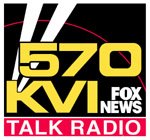National Review, Seattle, KVI Radio
JOINING THE FIGHT
National Review Rallies Behind Seattle Talkers
Could a disturbing ruling that effectively muzzles political talk radio in Washington state possibly be allowed to stand?
effectively muzzles political talk radio in Washington state possibly be allowed to stand?
As KVI / Seattle talkers Kirby Wilbur and John Carlson (in left image) await a state supreme court decision on whether the First Amendment will continue to apply in the Evergreen State, area media outlets are closely watching the situation.
While the case drags on, it now appears that where the battle lines are actually drawn is a bit more confusing than previously understood. During this crucial fight, has the radio station itself presented a united front?
And, though not directly involved in the suit, has KVI's management taken a coherent stance on the subject?
From the Seattle Times (Ralph Thomas and Andrew Garber, June 9):

 Now, conservative publication National Review is taking up the fight. Will the blogosphere join in next?
Now, conservative publication National Review is taking up the fight. Will the blogosphere join in next?
In an editorial, the magazine said it sees this ruling as the inevitable outgrowth of campaign finance "reform":
Today, National Review commentator Jim Geraghty notes:

In recent weeks, the Radio Equalizer has been challenged by radio industry insiders to say more about KVI management's weak response to this court battle. Oddly enough, even though it affects the station directly, the legal fight has been conducted independently of the station itself.
Perhaps because station parent Fisher Communications has always been run by exceptionally left- leaning managers and family owners, their infrequent statements on the matter have shown only tepid support for the station's hosts.
Critics, including some in the radio industry, have long accused the company of watering down programming to suit their own political stances.
For Wilbur and Carlson, it means the burden has become that much more difficult: to defend free speech, their careers and KVI's future, they must shoulder the burden for their employer, as well.
Your Amazon orders that begin with clicks here, regardless of your final purchases, are vital to supporting this site's efforts. Thanks again!
Carlson image: KING-5 TV
National Review Rallies Behind Seattle Talkers
Could a disturbing ruling that
 effectively muzzles political talk radio in Washington state possibly be allowed to stand?
effectively muzzles political talk radio in Washington state possibly be allowed to stand?As KVI / Seattle talkers Kirby Wilbur and John Carlson (in left image) await a state supreme court decision on whether the First Amendment will continue to apply in the Evergreen State, area media outlets are closely watching the situation.
While the case drags on, it now appears that where the battle lines are actually drawn is a bit more confusing than previously understood. During this crucial fight, has the radio station itself presented a united front?
And, though not directly involved in the suit, has KVI's management taken a coherent stance on the subject?
From the Seattle Times (Ralph Thomas and Andrew Garber, June 9):

At the center of the dispute are John Carlson and Kirby Wilbur, conservative talk-radio hosts for KVI who last spring ran an extensive on-air campaign for an initiative to overturn the biggest gas-tax increase in state history.
The initiative ultimately failed. But the legal fight over the anti-gas-tax crusade could set new boundaries for talk-radio hosts and determine at what point political speech becomes political advertising that can be regulated by the government.
Groups ranging from the American Civil Liberties Union to the Cato Institute, a libertarian think tank, oppose a lower court ruling that Carlson's and Wilbur's talk-radio campaign amounted to an in-kind political contribution to the gas-tax opponents.
If the ruling is allowed to stand, "it would give the government the power to micromanage and second-guess the editorial judgment of the press," William Maurer, an Institute for Justice attorney who represents the anti-gas-tax group, told the Supreme Court.
But the government lawyers who brought the case say reversing the ruling could open the door for powerful media corporations to become "king makers" by mounting unregulated political campaigns.
"In this case there was no limitation on anyone's right to speak," Mike Vaska, a Seattle attorney who represents four municipalities in the appeal, said in an interview this week. "The only requirement that came out of the case was that the people be informed about who was funding the campaign."
The case stems from a lawsuit filed by San Juan County and the cities of Seattle, Auburn and Kent last year against Nonewgastax.com, the group backing Initiative 912, which was aimed at repealing a new 9.5-cent gasoline-tax increase.
Last year, Thurston County Superior Court Judge Chris Wickham ordered that the I-912 committee had to disclose the on-air pitches as in-kind contributions from Fisher Communications, which owns KVI.
The I-912 campaign filed a countersuit, accusing the municipalities of infringing on the radio hosts' First Amendment rights. But Wickham dismissed the counterclaim, saying that Wilbur's and Carlson's close ties to the initiative rendered their on-air solicitations political contributions.
The ruling sent "shock waves" through the talk-radio industry, said Brian Maloney, a former KVI host who now runs Radio Equalizer, a Web site that focuses on talk radio.
"If it's allowed to stand... , it would be a devastating blow for freedom of speech on the radio," Maloney said.
 Now, conservative publication National Review is taking up the fight. Will the blogosphere join in next?
Now, conservative publication National Review is taking up the fight. Will the blogosphere join in next?In an editorial, the magazine said it sees this ruling as the inevitable outgrowth of campaign finance "reform":
Under Washington state law, initiative campaigns are not allowed to accept donations greater than $5,000 in the final 21 days leading up to an election. This posed a problem for Wilbur and Carlson, because their daily radio advocacy was listed as being worth more than $5,000 over a three-week period. If they continued to broadcast their arguments against the gas tax, they risked breaking the law. Outrageous as it seemed, the government would be able to prosecute them for publicly expressing themselves about a matter of public policy.
With the help of the Institute for Justice, Wilbur and Carlson have appealed to the state supreme court, which heard arguments in the case last Thursday. At issue are the state constitution’s guarantees of free speech, as well as the contours of the state’s campaign-finance law.
Washington’s campaign-finance regulations do make an exception for commentary published in outlets that are not controlled by a candidate or campaign committee. But the lawsuit against Wilbur and Carlson claims that the two of them became so closely connected to the anti-tax movement that they should be considered “principals” in the campaign. According to an attorney who filed the suit against the radio hosts, their efforts to collect money and signatures for Initiative 912 suggested “a level of control and involvement that would make them officers and/or agents of the campaign.” Thus, we are supposed to conclude, they ought to be muzzled.
It is depressing to see campaign-finance regulation descend to such disgrace. But it is also instructive. The persecution of Wilbur and Carlson is a case study in how campaign-finance laws, far from strengthening the democratic process, can undermine the rights of free speech and association on which any democracy worth the name depends.
Today, National Review commentator Jim Geraghty notes:

I had heard sporadically something about a campaign finance fight in Washington State; it wasn’t until I read the NRO editorial on Friday that I got the whole story and realized how big and important a fight this is.
In recent weeks, the Radio Equalizer has been challenged by radio industry insiders to say more about KVI management's weak response to this court battle. Oddly enough, even though it affects the station directly, the legal fight has been conducted independently of the station itself.
Perhaps because station parent Fisher Communications has always been run by exceptionally left- leaning managers and family owners, their infrequent statements on the matter have shown only tepid support for the station's hosts.
Critics, including some in the radio industry, have long accused the company of watering down programming to suit their own political stances.
For Wilbur and Carlson, it means the burden has become that much more difficult: to defend free speech, their careers and KVI's future, they must shoulder the burden for their employer, as well.
Your Amazon orders that begin with clicks here, regardless of your final purchases, are vital to supporting this site's efforts. Thanks again!
Carlson image: KING-5 TV



1 Comments:
Maybe it is time to recruit all of Carlson's TalkSpot listeners to support him now. I wonder if we could enlist James "Bo Snerdly" Golden to come out publicly for Carlson? James ran TalkSpot, and did a fine job with the talent.
By PCD, at 20 June, 2006 09:10
PCD, at 20 June, 2006 09:10
Post a Comment
<< Home